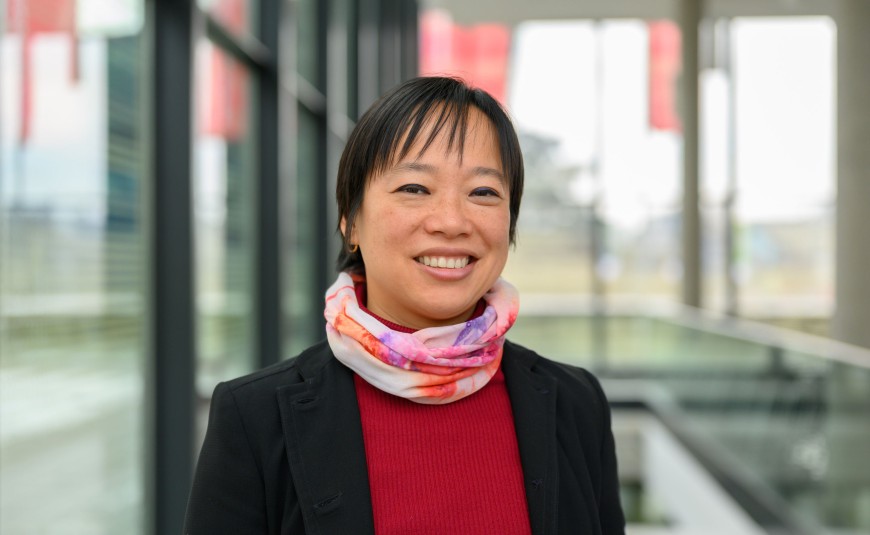“The mysteries of the human brain”
An interview with the new Humboldt Professor Angela Yu
2023/01/20
The US cognitive scientist Angela Yu has started her Humboldt Professorship for “Computational and Cognitive Neuroscience” at TU Darmstadt on 1 December 2022. The 45-year-old was previously Assistant Professor (2008-2015) and Associate Professor (2015-2022) at the University of California San Diego. We asked her a few questions about her start at TU Darmstadt.

Professor Yu, why should students be interested in your scientific subject? What makes it exciting?
How is it that humans are capable of such incredible things and yet so fallible? What could be more fascinating or fulfilling than understanding how the brain gives rise to the mind, or what makes us capable of consciousness and self-examination? No one knows how long it will take to find all the answers, but I know the journey will be thrilling.
At TU Darmstadt, interdisciplinarity is very important. Where in your field of work are there intersections with other disciplines?
Albert Einstein once declared “Understanding physics is child’s play when compared to understanding child’s play.” To understand how the brain gives rise to an intelligent being that can think, talk, feel, communicate, plan, and change the world, we need to gather and improve upon all the theoretical and experimental tools humans have invented to solve all kinds of natural and man-made problems.
We can think of the brain as a network of neurons, a sensitively balanced chemical system that can easily go awry in different psychiatric disorders, a computing device, a learning machine, a social agent, or other yet-unimagined analogies. The problem is so complex, that we are like the group of blind men groping at different parts of an elephant in the Indian parable. It is only when we can integrate all of these very different perspectives into a coherent whole that we can hope to understand what the brain really is, and how it gives rise to an intelligent being.
In which department at the TU would you like to spend a day? Why?
This is a difficult question. Being in an interdisciplinary field, I already go to talks and spend time in psychology, neuroscience, biology, computer science, electrical engineering, mathematics, economics, and medical science departments. If I find a field interesting, I simply invite myself over for a talk or a visit. I find that usually people are very welcoming.
If I would be a student today, I would…
The great thing about an academic is that I still feel like a student. Everyday I get the chance to learn about new things that I find interesting. Moving to Germany gives me even more opportunities to learn about new things – the language, the culture, how things work. Everyday is interesting and challenging.
The perfect balance to a stressful working day is …
A walk in a park or a forest. Or a fun conversation with colleagues or friends.
Background
Professor Yu’s work uses mathematically rigorous and algorithmically diverse tools to understand the nature of representation and computations that give rise to intelligent behavior, with particular regard to the challenges posed by inferential uncertainty and the opportunities afforded by volitional control. Using diverse machine learning and statistical tools, such as Bayesian statistical modeling, control theory, reinforcement learning, and information theory, theoretical frameworks and mathematical models are developed to explain disparate aspects of cognition: perception, attention, decision-making, learning, cognitive control, active sensing, economic choice, and social interactions.
With her expertise in computational neuroscience and cognitive science and her previous research on decision-making and social cognition, Angela Yu will strengthen and complement research at the Centre for Cognitive Science at TU Darmstadt and at hessian.AI, the Hessian Centre for Artificial Intelligence based in Darmstadt and supported by 13 universities, as part of her Humboldt Professorship for Artificial Intelligence.
Professor Angela Yu: Video of the Alexander von Humboldt Foundation
Recommended external content
We have selected external content from YouTube for you and would like to show it to you right here. To do this, you must reveal it with one click. You can hide the external content at any time with another click.
I agree to external content from YouTube being shown to me. This may result in personal data being transmitted to third-party platforms. You can find more information in our Privacy Policy.
Alexander von Humboldt Professorship
The Alexander von Humboldt Professorship, which is endowed with up to five million euros, is the most highly endowed German science award and is granted exclusively to researchers who are world leaders in their field as well as working abroad. The Humboldt Professorship is funded by the Federal Ministry of Education and Research. It enables long-term, forward-looking research to be carried out at universities and research institutions in Germany and makes a lasting contribution to Germany's international competitiveness as a research location. Since 2008, up to ten Humboldt Professorships have been awarded each year for this purpose. In 2020, the Alexander von Humboldt Professorships for Artificial Intelligence (AI) were also created.
TU Darmstadt has already received this special award for the third time: with a professorship for the nuclear physicist Dr Alexandre Obertelli, TU Darmstadt was able to attract the first Humboldt Professorship in Hesse in 2018. After Professor Angela Yu in 2021, TU Darmstadt was awarded another and third Humboldt Professorship by the Alexander von Humboldt Foundation in November 2022 in the person of Dr Markus Rohrbach.
pb/CogSci/Alexander von Humboldt Foundation
